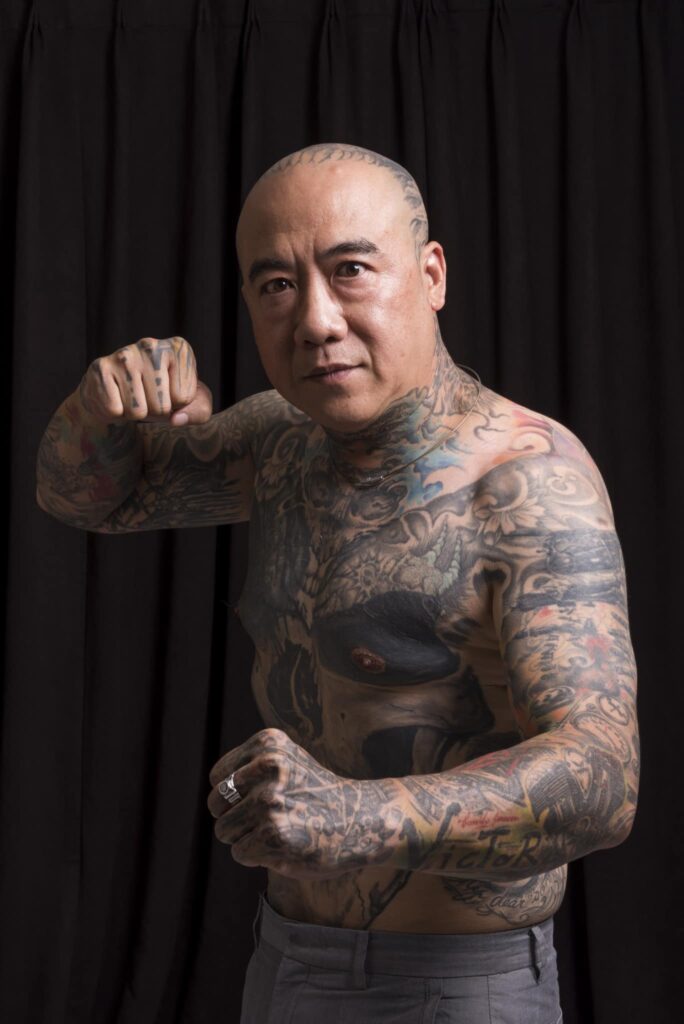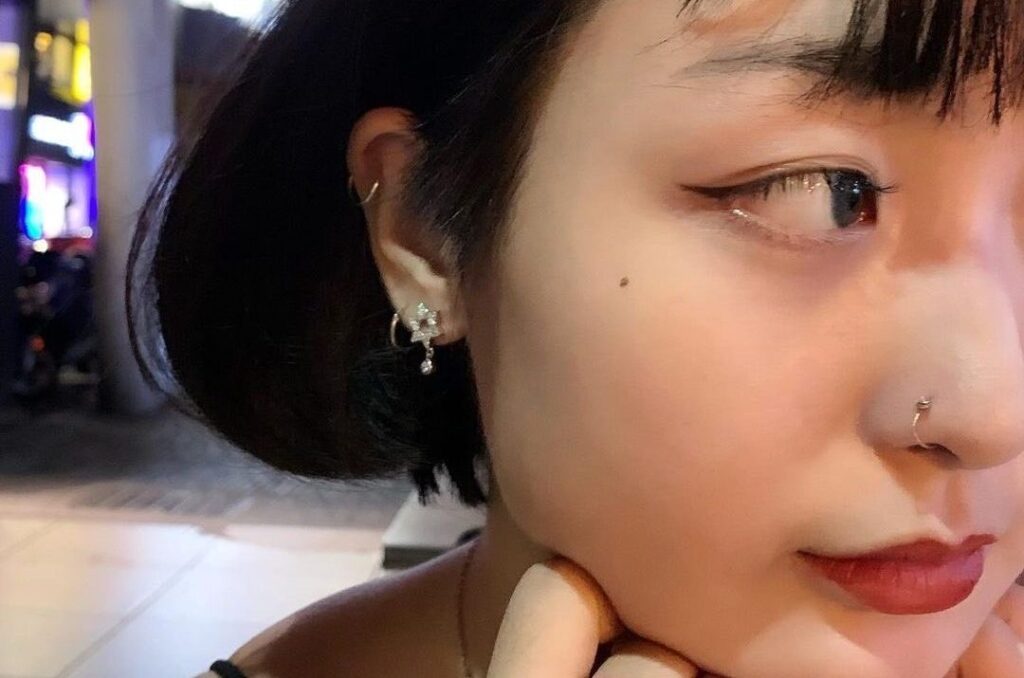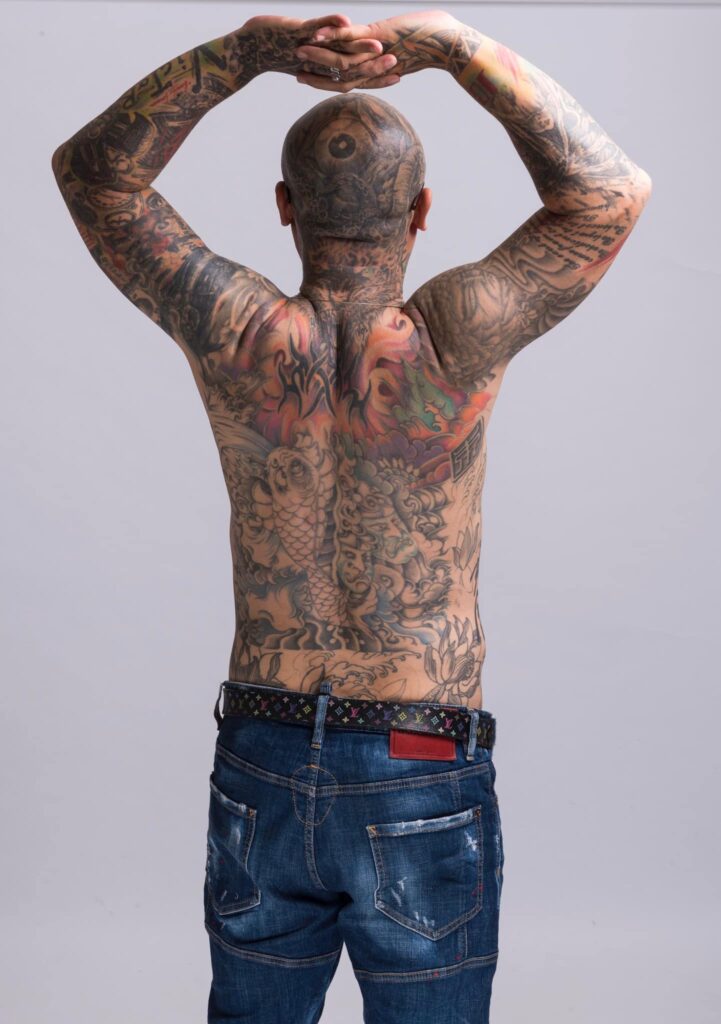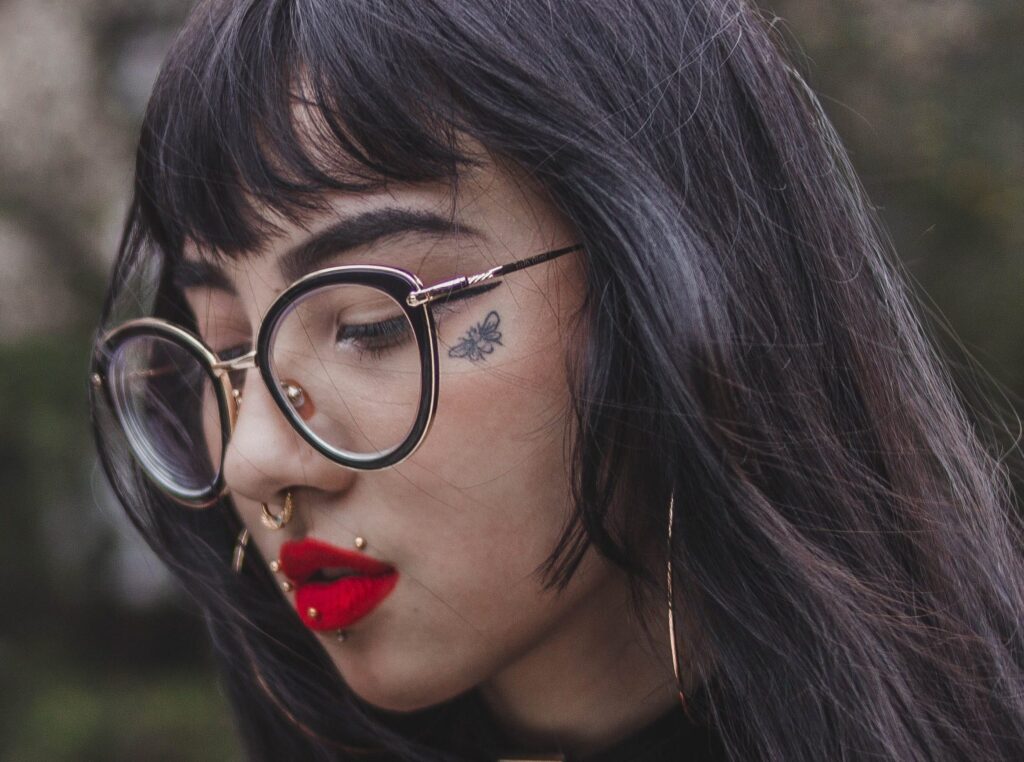Reporters/Yu-lin Hsiao, Li-yu Yeh, Hsin-tong Yu, Yu-Yang Lu
“If it’s alright to equate tattoos with villains, why not equate an intellectual with a scumbag?” Ciao-Ben Ruan, nicknamed Iron Daddy, questioned. He has tattoos all over his body, even his scalp. As a sociatal leader with nearly 200,000 followers on Facebook, Ruan could be regarded as a public figure. He seemed not surprised that Taiwanese people generally associate tattoos with gangsters, delinquents and people with negative images.

Ruan blamed the news industry in Taiwan for disparaging people with tattoos. “In the eyes of the public, people with tattoos must have committed crimes. Why don’t the media report the good things done by tattooed people? We (tattooed people) are easier to be recognized, since ordinary person have no conspicuous features to identify with, so they might be forgotten easily,” Ruan said. He cited an example by saying, “Zheng Jie, the relentless criminal who committed random killing was tattooed-free, but didn’t he stab a lot of people?” Ruan felt that nowadays, in order to stimulate the click through rate, local media often target the perpetrators in social news and focus on the characteristics of their appearance. But this kind of reporting often misleads the public, causing a general misconception of tattooed populations. Along with misunderstandings, bigotry and intolerance against tattooed people have become ingrained in the hearts of many.
Reiterating that it is easy for the outside world to equate tattoos with negative images, tattooed groups have to face discrimination everywhere. Iron Daddy shared a story which happened to him before. Since he was interested in politics, he was recommended by a friend to join a political party. After handing in his photos, the high-level officials refused to accept his party registration because of “unfavorable impressions.” “Lee-Hom Wang, who is a famous singer, has an awesome image, but he is still embroiled in a divorce scandal. It is really nonsense to say that people who are tattooed-free are saints!” he sighed. This kind of incident made him feel remorseful that tattoos have shattered his societal reputation again and again, as the public still refuses to focus on people’s behavior and character, but rather pins their attention on their appearance.
Iron Daddy said that Taiwan vigorously advocates democracy and equality, but for the tattoo community, there are still many shackles in daily life. He cited Taiwan’s government employees, such as police and soldiers, are not allowed to have tattoos. In contrast, police in the United States and Thailand are not restricted against tattoos. Therefore, he wanted to join the election for city councilor, with the hope of using his identity to overturn common prejudice against people with tattoos. “Tattoos should not be equated with baddies. If I were elected as a city councilor, I would be the first representative of the people in Taiwan with tattoos all over my body!”
Zhi-Qiao Xia, who used to be a tattoo artist, did not get support from her family when she was self-studying to become a tattoo artist. Her mother even said that she would disown her if she gets a tattoo. Even without the support of her family, she did not stop learning tattoo skills. Xia believed that as long as she has an interest in this trade and what she is doing, she needs not fear the criticism of others.

When it comes to how Taiwanese society views tattooing and piercing culture, Xia has a very interesting theory: she believed times are changing. Nowadays, more and more people can accept tattoos and piercings. For Xia, no matter what era you live in, “being yourself is an honor, because nobody else can be you.”
For those who want to get tattooed, Xia suggested them to do their homework, which includes researching on their favorite tattoo artist, their favorite style and pattern, and most importantly, making up their mind. For those who are considering piercing, she said that piercing is not like having a tattoo. Once a certain part of one’s body is pierced, it is difficult to recover without any trace. Therefore, for those who want to pierce, they need to pay attention to sanitation and personal hygiene to ensure speedy recovery. Infection can thus be avoided.
How do foreigners view Ink and Iron
Talking about her views toward people with tattoos, Ueda Rena said that Japanese usually do not have large-scale tattoos, which is exclusively a trait of the “Yakuza” or organized crime. In fact, most Japanese dare not approach people with large tattoos.
“In the days of my mother and grandma, the established impression of tattoos was that they were usually connected to the Yakuza or the underground society. So, the acceptance for tattooing was not high at that time. I was influenced by my mother, so I don’t really like tattoos,” Rena explained.

In addition, Japanese society also has some prohibitions about tattoos, for example, to avoid frightening other customers, many hot spring houses will deny customers with large tattoos from entering; some companies also choose not to hire applicants with tattoos. Besides, when fathers with tattoos go to elementary schools and kindergartens to pick up their children, they will wear long sleeves or oversleeves to prevent their tattoos from being exposed.
Rena said that comparing the same age group of her classmates from Japan and Taiwan, the tattoo phenomenon is less obvious in Japanese society. None of her Japanese friends have tattoos, but when Rena studies at her Taiwanese campus, students will have large and small tattoos on their body. Therefore, it is fair to say that tattooing is quite common in Taiwan.

From Rena’s observation, nowadays, foreign idols and internet celebrities have tattoos on their bodies and post it on social media, thus influencing Japanese young people around the age of 20 to grow increasingly accepting of tattoos. “But I don’t think that I, as a young Japanese, will have tattoos in the future,” Rena said.
Daniel Hansen from the US said, “Americans have very polarized views about tattoos. Some people think that tattoos are unacceptable. Moreover, under the influence of traditional Christian ban on tattoos, Americans’ opposition of tattoos is becoming more obvious nowadays. In addition, many parents do not agree with the practice of tattooing. “Parents always want their children to take care of themselves and expect them not to try something that they think is cool,” Hansen stressed. However, he claimed that he sees tattoos as an artistic expression. “I think tattoos are an interesting way to present art and one’s connection with his body,” he said. Hansen also observed that when his friends get new tattoos, he feels quite excited, because it is a manifestation of “body autonomy” among college students.
On the other hand, Hansen believed that the American public has a high degree of acceptance of piercing, since “lobe piercing” is extremely common among women, but it is still less obvious among men. Still, Hansen chose to have a pair of piercings on his lobes.
Aftercare is indispensable
In the past, there were many negative stereotypical impressions about tattoos. With the evolution of time, tattoos have gradually become accepted by the general public. In addition to tattoos, more and more people also choose to pierce parts of their bodies. Dr. Qi-Xian Wang, a dermatologist, said that whether it be tattoos or piercing, there will be blood contact and damage to the skin tissue, which in turn may lead to blood-borne diseases such as hepatitis B, hepatitis C and even AIDS.
Dr. Wang mentioned that the fluttering eyebrows and microblading eyebrows which are commonly practiced among women are also considered a kind of tattoos. Practitioners use needles to pierce the pigment particles into the skin of their customers or clients. Different from ordinary tattoos, the fluttering eyebrows and microblading eyebrows are pierced on the superficial skin, while tattoo is ingrained into the deep skin. She said that as long as the ink can stay in the skin for more than a month, it should be regarded as a tattoo.
In addition, Dr. Wang reminded the public that whether it be tattoo or piercing, there is a risk of allergies. Since tattoos may have many colors, with red being the color that will most likely cause allergies, people interested to have tattoos must take precaution. Moreover, nickel is another likely cause of allergies. She recommended women to wear pure gold or steel jewelry after ear piercing to reduce allergic reactions.
Dr. Wang also would not suggest tattooing and piercing for people with keloid because needles or tools will be used to make artificial holes in the body. If the clients have keloid, they might have enlarged and raised keloid exceeding their original expectations.

It goes without saying that not everyone agrees with the fact that tattoos are an art. Some even have negative stereotypical impressions that those with tattoos are bad guys, violating religious norms on purpose. However, supporters point out that tattoos are often a way to commemorate someone or something with personal body autonomy, which is also a form of art shown on one’s body. As for piercing, not only is it more acceptable to the general public than tattoos, but also lobe piercings are more common than other body piercings. Be it tattoo or piercing, there is one thing for certain: Ink and iron with the body as a canvas will certainly be a culture that will be passed down from generation to generation.


